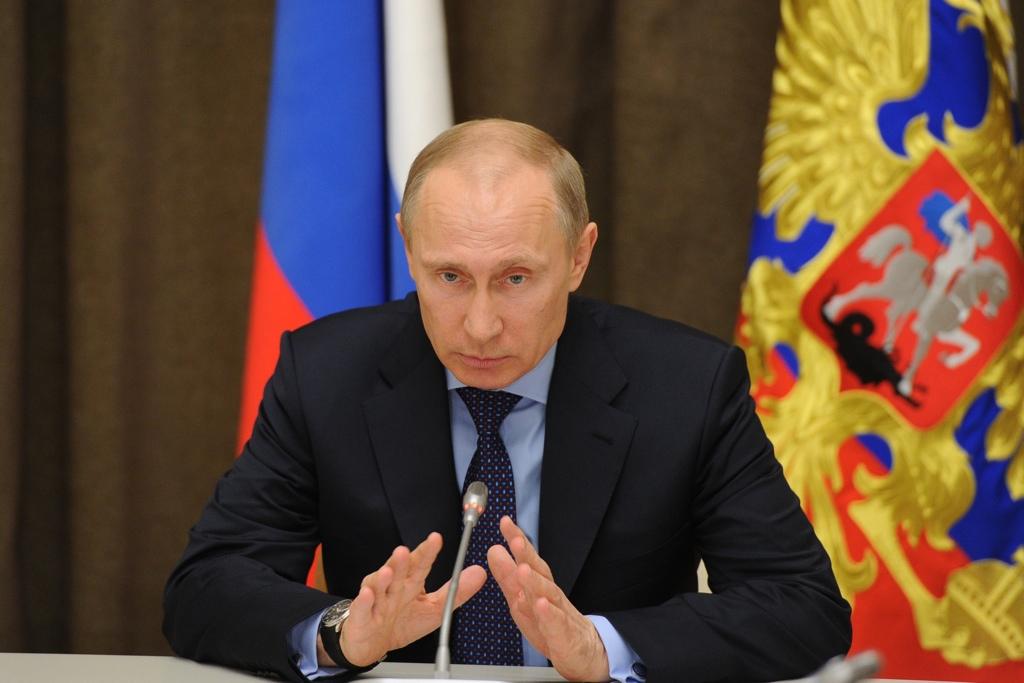Q&A: ‘We need shock and awe’ against Russia
Should Putin worry?
BUZZARDS BAY, Mass. — As the United States’ and Europe’s new sanctions against Russia begin to take effect, all eyes are watching Moscow for a reaction.
They may wait in vain, says Anders Aslund, an expert on economies in transition specializing in Russia, Ukraine and other countries in the post-Soviet space.
The current sanctions can accomplish little, he says.
Aslund has been writing about Russia’s economy since the Soviet days, when his landmark study, “Gorbachev’s Struggle for Economic Reform,” shed light on the inner workings of the Kremlin decision-making process.
The Swedish economist has also functioned as an economic adviser to Russian, Ukrainian and Kyrgyz governments.
GlobalPost spoke to Aslund for an analysis of the likely effects of the new sanctions. His verdict: “We need much more.”
GlobalPost: What will be the likely effect of the new economic sanctions on Russia’s economy?
Aslund: Russsia’s economy is vulnerable to sanctions. We saw an almost 12 percent slide in the stock market on March 3, in response to the crisis in Ukraine. The new sanctions will depress economic growth down to 1 percent this year. The forecast was for 2.5 percent, which I think was optimistic, but in any case we now have slower growth. The longer the sanctions go on, the more effect they will have.
What effect are the sanctions likely to have on Russia’s behavior?
Very little, if the purpose of the sanctions is to change Putin’s policies. We need much bigger sanctions to do that. What we need is for state corporations to be taken out of the world financial system, as was done with Iran. If that is done, private money will leave, and the state becomes non-creditworthy.
If Rosneft [Russia’s state oil company], Gazprom [the state natural gas monopoly] and Russian tech firms are beyond the pale for international trade, then we will see real damage to Russia’s economy.
But wouldn’t that be dangerous for Europe, which is dependent on Russian gas?
Europe is not all that dependent any more. Russia used to supply 47 percent of Europe’s gas; now it’s down to 30 percent, and its share is still falling. There is an oversupply of shale gas and LNG [liquefied natural gas]. Gazprom has been delivering gas to Europe by pipe, and it accounts for 15 percent of Russia’s export earnings.
Does Russia have any economic levers it can use to retaliate against the United States?
Nothing of any significance. Russia has oil and it has uranium. That’s it. Russia does very little trade with the United States — less than $40 billion combined. That’s tiny.
[Bilateral trade in 2013 totaled $11 billion in US exports to Russia and about $27 billion in imports to the US.]
So what should the Obama administration be doing if it wants to get Putin to change course?
The big question now is whether Russia will attack eastern Ukraine or not. I would suggest that Obama frontload the sanctions. The usual thinking is to stagger them out, but if you want to deter Russia, you need to act now.
Watch GlobalPost video: Awaiting Russia’s next move at Ukraine’s eastern border
The alternative to successful deterrence is war, and if a war begins in Ukraine it will draw in so many countries.
War is unpredictable; but if a war begins between Russia and Ukraine it will be bloody — very, very bloody.
How great is the danger of war?
It is quite possible. Putin can be compared to Hitler — I have written about this.
I have outlined the similarities between Putin’s address [to the Duma] on March 18 and Nazi Germany’s public advocacy in 1938-39. It is a valid comparison.
You know what the Russians say: Appetite comes with eating.
Do you think that the West has the political will to follow through?
If you look at Obama’s speech when he announced the new sanctions yesterday [Thursday], there was a new tone to it. I think he is finally coming around. The Treasury Department’s statement was also really tough. Europe is tagging along as well.
I would expect that there will be new sanctions, even tougher ones, next week. I hope that they will be targeted, not at individuals, but at corporations, as I have suggested.
What we need is the Powell doctrine here. [General Colin Powell, who, as chairman of the Joint Chiefs of Staff in 1990, advocated that the US use overwhelming force if it is committed to war.]
We need “shock and awe.” The alternative is war.
The story you just read is accessible and free to all because thousands of listeners and readers contribute to our nonprofit newsroom. We go deep to bring you the human-centered international reporting that you know you can trust. To do this work and to do it well, we rely on the support of our listeners. If you appreciated our coverage this year, if there was a story that made you pause or a song that moved you, would you consider making a gift to sustain our work through 2024 and beyond?
